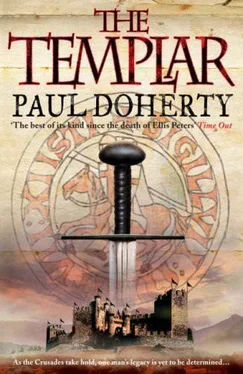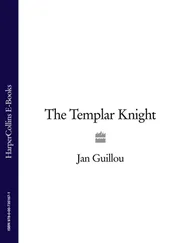P. Doherty - The Templar
Здесь есть возможность читать онлайн «P. Doherty - The Templar» весь текст электронной книги совершенно бесплатно (целиком полную версию без сокращений). В некоторых случаях можно слушать аудио, скачать через торрент в формате fb2 и присутствует краткое содержание. Год выпуска: 2010, ISBN: 2010, Издательство: Minotaur Books, Жанр: Исторические приключения, на английском языке. Описание произведения, (предисловие) а так же отзывы посетителей доступны на портале библиотеки ЛибКат.
- Название:The Templar
- Автор:
- Издательство:Minotaur Books
- Жанр:
- Год:2010
- ISBN:9780312576837
- Рейтинг книги:5 / 5. Голосов: 1
-
Избранное:Добавить в избранное
- Отзывы:
-
Ваша оценка:
- 100
- 1
- 2
- 3
- 4
- 5
The Templar: краткое содержание, описание и аннотация
Предлагаем к чтению аннотацию, описание, краткое содержание или предисловие (зависит от того, что написал сам автор книги «The Templar»). Если вы не нашли необходимую информацию о книге — напишите в комментариях, мы постараемся отыскать её.
The Templar — читать онлайн бесплатно полную книгу (весь текст) целиком
Ниже представлен текст книги, разбитый по страницам. Система сохранения места последней прочитанной страницы, позволяет с удобством читать онлайн бесплатно книгу «The Templar», без необходимости каждый раз заново искать на чём Вы остановились. Поставьте закладку, и сможете в любой момент перейти на страницу, на которой закончили чтение.
Интервал:
Закладка:
‘What about her?’
‘Nothing, mistress.’ Imogene’s voice turned weary. ‘I have told you the truth about myself. It’s wrong to tell you the truth about others.’ She smiled thinly. ‘I am not afraid of the truth. I suspect your brother and Godefroi already suspect who I am.’ She got to her feet. ‘Yet what threat do I pose, sister? Like you, I wish to journey to Jerusalem, but my reasons, like everyone else’s, are a matter of the heart. Perhaps I will find comfort in bringing home the ashes of my parents; forgiveness for living after they died; absolution for my deception.’ She undid her cloak. ‘Get rid of my burdens and find some peace.’
Part 3
Radosto: The Feast of St Isidore, 4 April 1096
Dies quoque angustiae moeroris ac tristiae .
(A day also of bitter mourning and sadness.)
The Dies Irae of St Columba
‘To the right!’ Hugh de Payens’ voice, dry and cracked, shrieked a warning.
Eleanor, standing between two high-wheeled carts, wiped the sweat and dirt from her face. She brought up the arbalest, then lowered it. The morning mist played tricks on her eyes and Eleanor, like the rest of her companions, was exhausted. She stared along the line of carts and makeshift barricades the Provençal captains had thrown up. The absence of their commander, Raymond of Toulouse, was deeply felt. Perhaps they should have taken up a better defensive position. The Provençal line, bending slightly like a bow, stretched between two copses of trees. Behind them open heathland ran down to a stream, where their horse lines had been fixed. Eleanor took a waterskin and drank greedily, splashing more on her face before handing it to Imogene, who squatted trying to organise the crossbow bolts on a tattered sheet. The widow woman, black hair bound with a piece of string, smiled back, then coughed, spluttering how she was full of the rheums, her throat sore, her ears aching. She grumbled on as Eleanor patted her gently on the head. Over the last few weeks, during their nightmare journey from Istra down the Dalmatian coast, Imogene and Eleanor had become firm friends. They had, as Eleanor wrote in her chronicle, little choice but to unite against the dangers that confronted them. Imogene cursed as she cut her finger on the barbed edge of a bolt. She smeared some of the blood on her face.
‘Just in case the Greeks,’ she nodded towards the far haze of moving dust, ‘overrun us. They won’t rape the ugly ones!’
Eleanor stared despairingly up at the cloud-free sky. A buzzard came floating over and she wondered if the prospect of blood, her blood, had summoned it. The weather was turning balmy with the first hint of summer. They had travelled along the Via Egnetia to the Greek city of Dyrrachium and across northern Greece, arriving here outside Radosto only a few miles from Constantinople, yet their nightmare was not over. Alberic remarked how they were crossing Macedon, the wild, savage countryside that had once housed the great Alexander. Eleanor did not care for such history. The dark forests, rushing rivers, deep gorges and lonely meadowlands, from where the livestock had been driven away, were forbidding, rather haunting. Nevertheless, Macedonia for all its sombreness was a welcome relief from that nightmare road along the Dalmatian coast through Sclavonia. A dreadful dream of a journey, with the mist swirling as thick as fuller’s cloth across a trackway slippery with ice and littered with boulders and fallen trees. On either side of this pathway rose thick, dense forests whilst the wind cut along it like a razor. Nothing ahead, nothing behind but that mist curling like a host of ghosts.
Imogene said something. Eleanor was too tired to reply, and sat down with her back to the cart, staring across the heathland at the stream still bubbling from the spring rains.
Sclavonia! A barren land, Eleanor reflected, nothing but trees and mountains and that murk hanging like some vapour from hell cutting off sight and deadening sound. They rarely saw or heard any animal or bird. An eerie silence broken only by the sounds of their own straggling line of eighteen hundred souls on their horses and carts. The Poor Brethren of the Temple, their banner hanging limp from a pole, trudged along with the rest. Now and again the silent drudgery was shattered by swift, savage attacks. The Sclavs, who’d fled from their villages taking their livestock and precious food supplies with them, crept back to haunt the cross-bearers. They would follow the column, hanging on their flanks or rear, ready to attack any stragglers. They’d lop off heads, tie them to their standard poles and, if pursued, flee back into their mountain fastness. Eventually Count Raymond, tense and frenetic, moved mailed knights back to the rear of the column. He also asked Hugh, Godefroi and the Poor Brethren to sweep up the stragglers. A daunting task! A vigil that dominated the long, freezing days when the clouds seemed to descend so that when they did attack, the Sclavs were almost on them before anyone realised what was happening. Eleanor and the others fought back with crossbow, lance, spear and dagger. She recalled one attack. A Sclav, his bearded face all bloodied, climbed over the cart, crawling towards her. She shattered his head with an axe and pushed his corpse, blood pumping out, off on to the trackway.
Day after day the same numbing routine, cold, silent and hungry, until those hideous figures came shrieking out of the mist. Eventually Count Raymond decided on more punitive measures. They could not pursue their tormentors, who fled back into their rocky hiding places, so the Count turned on any prisoners taken. Eyes were gouged out, noses slit, hands and feet hacked off. The captives were left blinded, disfigured, bleeding hunks of flesh as a stark warning to other tribesmen to leave them alone: Eleanor would never forget those screaming men and women left crawling blindly about on the ice-bound trackways.
Eventually they reached Scodra. Count Raymond tried to negotiate a truce with the King of the Sclavs, but the aggression continued until they crossed the imperial border and reached the territory of Alexius Comnenus around the town of Durazzo. They all breathed a sigh of relief, especially when the Emperor sent letters of peace and offered supplies as well as news about other Frankish leaders swiftly approaching Constantinople. Imperial scouts closed in around them: Cumans in their quilted armour, along with Turcopoles, Buglars, Patzinacks and other mercenary cohorts. The Poor Brethren of the Temple believed they were safe. Hugh and Godefroi were pleased to doff their chain mail and heavy helmets. Norbert and Alberic celebrated a Mass of thanksgiving on an altar set up on one of the great two-wheeled carts. Peter Bartholomew announced he had experienced a vision of the tears of St John, who, as in the Apocalypse, wept at the thought of how the Poor Brethren and others had suffered in Sclavonia. The respite proved illusory. The Emperor’s mercenaries took to pillaging and harassing Count Raymond’s army. Fierce sword quarrels took place in which two Provençal leaders along with knights, women and children were killed. Even Bishop Adhémar of Le Puy received a knock to the head, and had to be sent under safe conduct to the city of Thessalonica.
By the time Count Raymond’s army reached the town of Roussa, its patience was exhausted; the townspeople there were unable, or unwilling, to trade, and fighting broke out during which shops and warehouses were pillaged. Running fights took place between townspeople and Count Raymond’s followers. Greek troops appeared, mounted men-at-arms with their oval shields supported by mercenaries, mounted archers and, more dangerously, Catephracti, the heavy-mailed cavalry of whom, Hugh assured Eleanor, Count Raymond was very wary. A truce was eventually arranged. Greek envoys entered the camp to beseech Count Raymond to accompany them to Constantinople to meet the Emperor, who was already negotiating with other Frankish leaders. The Count accepted the invitation and travelled on in haste, leaving his eighteen-thousand-strong host under the joint command of the Vicomte of Béarn and the Count of Orange; two young men who, in Godefroi’s opinion, hardly knew the difference between north and south, let alone how to command an army.
Читать дальшеИнтервал:
Закладка:
Похожие книги на «The Templar»
Представляем Вашему вниманию похожие книги на «The Templar» списком для выбора. Мы отобрали схожую по названию и смыслу литературу в надежде предоставить читателям больше вариантов отыскать новые, интересные, ещё непрочитанные произведения.
Обсуждение, отзывы о книге «The Templar» и просто собственные мнения читателей. Оставьте ваши комментарии, напишите, что Вы думаете о произведении, его смысле или главных героях. Укажите что конкретно понравилось, а что нет, и почему Вы так считаете.












